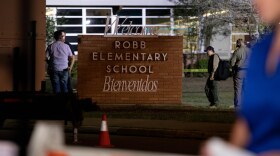We’re now 15 months out from the Robb Elementary School shooting in Uvalde. Ever since, children’s mental health has been on the minds of Texans statewide. But has this concern been overshadowed by schools prioritizing school safety and security forces?
In the latest episode of Mind of Texas, host Ike Evans spoke with Andrew Hairston, a civil rights attorney and writer, who serves as the education justice project director of Texas Appleseed. The two of them discuss why students’ mental health may be given the back seat and how it affects children who have been marked as "different."
This transcript has been lightly edited for clarity.
Evans: It seems that these days mental health in schools, or just mental health for kids, is seen as a subcategory of school safety rather than a funding category in its own right. How do you feel about that? And does that really work for schools in Texas?
Hairston: Most recently we’ve heard reports of a few independent school districts who are creating their own internal police departments. And this is not a new occurrence — there are hundreds of internal school police departments in Texas. But it’s under the guise or under the auspices of the idea that if the officers are trained in mental health programming then they can respond to the needs of young people better.
As I reflected on this, it sounds good on paper, it sounds good for a press release. But if you were really concerned with the well-being and the mental health of young people, which I think should be paramount in this phase of 2023, then you would absolutely invest in the trained mental health professionals who understand child development very incisively and who can respond to the ongoing crisis of the pandemic that is showing up in schools across Texas.
Evans: You have a particular focus on school discipline. I want to ask how big a problem does Texas have with unequal discipline? And what is the evidence for it?
Hairston: I think in so many ways in Texas, we have just seen that philosophy of zero tolerance and that children are to be seen and not heard pervade so many classrooms across the state, and particularly as young people try to express themselves and understand their position in the world. [When young people engage in] an interrogation of social injustices like George Floyd or Breonna Taylor — these Black folks who are murdered by the police — you will see perhaps this machine kind of bear down upon them [like] the philosophy of zero tolerance. Infrastructure like alternative education, suspensions, expulsions, the tens of thousands of school police officers who patrol campuses [can] unfortunately lead to some hard physical and psychological outcomes for young people.
Evans: It's not just kids of color that we're talking about. So this issue impacts, you know, kids who have been marked out as different in other ways, for example, kids with intellectual and developmental disabilities. What can you tell us about that and how that ties in?
Hairston: They are very much so married to each other, how those components of the school to prison pipeline will push out young folks, particularly when there's an intersection of Black and brown children who have disabilities.
Evans: Is there a sense in which when it's Black kids that they are in some sense less legible to white teachers?
Hairston: Not legible. I like that framing and that expression. Nobody tries to really understand Black children. You know, you can kind of think about how children are treated generally in the U.S. where there are not as many protections and legal rights available to them because you trust that the custody of their parents will get them to a certain point in their lives. But then you add the pernicious stereotypes around Black people in the U.S. and generally the society not being interested in interrogating the Black experience and knowing why Black folks show up in spaces the way that they do. But how Black folks have survived after being deprived of so many resources across generations.
And so those two stereotypes might converge to say, well, you know, we have a Black child with a disability, zero tolerance. We don't care why the child is acting out on a particular day. We just want to push them out of the classroom, push them into a disciplinary alternative education program, and not fully understand the complexity of their experience. And that nuance, Ike, that complexity is so important coming out of the coronavirus pandemic, where everybody has been transformed in radical ways and all of us deserve abundant grace and compassion in our workplaces, in our schools, in our communities of faith, in our general society. But often Black children do not get that benefit.






